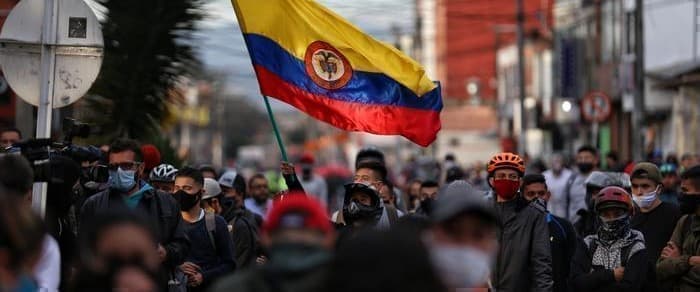Once again, for the third time in less than two years, Colombia is saturated by protests sparked by President Ivan Duque’s proposed tax reforms which are aimed at stabilizing government finances. For at least four days protests raged across many of Colombia’s major cities with the most violent occurring in Santiago de Cali, the Andean country’s third-largest city. Protests are continuing, despite Duque announcing the withdrawal of the controversial tax bill and the resignation of Finance Minister Alberto Carrasquilla. This is further evidence of Colombia’s intensifying political turmoil and escalating security crisis which is impacting the country’s economically crucial petroleum industry that was responsible for 17% of fiscal revenue, a third of exports by value and 3% of gross domestic product during 2020.
Violence and lawlessness across Latin America’s third-largest oil producer rose sharply after Duque ascended to Colombia’s top office in 2018 when he beat leftist presidential candidate and senator Gustavo Petro. The COVID-19 pandemic is amplifying many of the Colombian state’s structural weaknesses including fragile finances, a weak commodity-dependent economy, and inability to provide security in many regional areas outside of the major cities. The pandemic and Bogota’s lockdown measures are driving poverty ever higher in Latin America’s fourth-largest economy. Colombian government statistical agency DANE stated that 42.5% of Colombia’s population was living in poverty by the end of 2020, compared to 35.7% at the end of 2019 before the pandemic. Related: Could Oil Prices Hit $80 Per Barrel?
It is this rapidly rising poverty which is a key driver of the sharp increase in violence that has occurred since Duque took office in August 2018. Colombian peace think tank Indepaz recorded 34 massacres for the first four months of 2021 which is seven greater than for the same period last year. That is only two less than the 36 massacres recorded (Spanish) by the UN for the full year 2019, which was described as the most violent year since 2014. This indicates that lawlessness is rising, notably in regional areas, which will likely see further assaults on petroleum industry infrastructure, particularly with the industry’s social license deteriorating.
The severity of the security crisis is underscored by Colombia’s peak oil industry body the Colombian Petroleum Association (ACP – Spanish initials) issuing a December 2020 statement (Spanish) condemning violent assaults on oilfields in the eastern Llanos Basin.
The Duque administration’s apparent unwillingness to fully implement the controversial 2016 FARC peace treaty is another contributor to spiraling violence. Many demobilized guerillas have returned to arms because of Bogota’s failure to guarantee their safety and dissident FARC groups which did not recognize the peace accord are actively recruiting. The number of former FARC guerillas who have spurned the peace deal and rewarming is growing, as is recruitment by dissident groups. It is estimated, according to dated reports, that there are now over 2,300 dissident FARC guerillas compared to around 300 when the controversial peace agreement was signed. Related: Are Big Oil’s Renewable Investments Paying Off?
Duque’s failure to implement the peace deal coupled with rising violence means that Colombia has not enjoyed the economic boom it was expected to bring. That coupled with a surge in the number of non-state armed groups operating in Colombia’s border and rural regions is placing the urgently required onshore exploration boom at risk. An important outcome of the FARC peace deal was that it would allow oil companies to explore parts of onshore Colombia for the presence of hydrocarbons that were previously off-limits because of the presence of guerillas. Colombia urgently needs to boost its economically crucial oil and natural gas reserves. Colombia’s energy ministry stated in April 2020 that proved oil reserves only totaled a paltry two million barrels with a meager six-year production life, posing a significant headwind to Colombia’s petroleum-dependent economy.
For these reasons, the operational tempo of Colombia’s hydrocarbon sector has yet to rebound to anything resembling pre-pandemic levels. According to the Baker Hughes Rig Count, a good de-facto measure of oil industry activity, there were only 14 operational drill rigs in Colombia at the end of March 2021. That is one less than a month earlier and almost half of the 25 rigs for the same month in 2020.
Data from Colombia’s energy ministry indicates (Spanish) that hydrocarbon production remains weak. February 2021 oil production plunged 15% compared to the same month a year earlier while the natural gas output of 1.1 million cubic feet daily was flat.
Colombia’s petroleum industry is under considerable pressure which is only being ratcheted higher by heighted political turmoil and rising lawlessness, with 2021 shaping up to be one of the most violent years in a decade. This will only deter foreign investment in urgently needed onshore hydrocarbon exploration and production If Bogota is to successfully reactivate the petroleum industry and oil-dependent economy. For as long as the violence and disorder, much of it sparked by Duque’s poor policy decisions, continues oil industry operations, especially exploration, will suffer.
By Matthew Smith for Oilprice.com
More Top Reads From Oilprice.com:
- Big Oil Hikes Dividends After Blowout Quarter
- The Wider Ramifications Of A China-Aramco Deal
- Oil Investment Lags Jump In Crude Prices


















